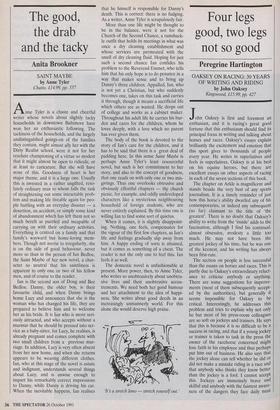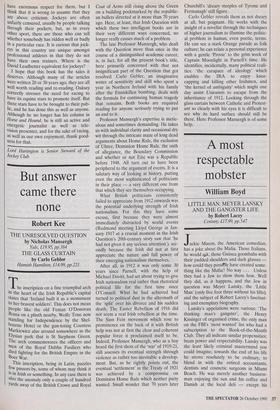Four legs good, two legs not so good
Peregrine Hartington
OAKSEY ON RACING: 30 YEARS OF WRITING AND RIDING by John Oaksey Kirzgswood, €15.99, pp. 427 John Oaksey is first and foremost an enthusiast, and it is racing's great good fortune that this enthusiasm should find its principal focus in writing and talking about horses and races. Oaksey's essays explain brilliantly the excitement and emotion that this sport gives to thousands of people every year. He writes in superlatives and feels in superlatives. Oaksey is at his best on his equine heroes, but there are excellent essays on other aspects of racing in each of the seven sections of this book.
The chapter on Arkle is magnificent and stands beside the very best of any sports journalism. It is a timely reminder of just how this horse's ability dwarfed any of his contemporaries, or indeed any subsequent (so far) claimant to the title of 'the greatest'. There is no doubt that Oaksey's ability to write from the 'inside' adds to the fascination, although I find his continual, almost obsessive, modesty a little too much. He may not have been the greatest jockey of his time, but he was one of the keenest, and his writing has always been first-rate.
The section on people is less successful than the essays on horses and races. This is partly due to Oaksey's extraordinary reluct- ance to criticise anybody or anything. There are some suggestions for improve- ments (most of them subsequently accept- ed by the authorities), but generally it seems impossible for Oaksey to be critical. Interestingly, he addresses this problem and tries to explain why not only he but most of his press-room colleagues are so soft on jockeys and trainers. He says that this is because it is so difficult to be a success in racing, and that if a young jockey or trainer is taken to task in the press the owner of the racehorse concerned might lose faith in his employee and thus perhaps put him out of business. He also says that the jockey alone can tell whether he did or did not make a mistake riding in a race and that anybody who thinks they know better than the jockey is a fool. I cannot accept this. Jockeys are immensely brave and skilful and anybody with the faintest aware- ness of the dangers they face daily must have enormous respect for them, but I think that it is wrong to assume that they are above criticism. Jockeys are often unfairly censured, usually by people talking through their pockets, but, as in every other sport, there are those who can tell whether somebody has ridden well or badly In a particular race. It is curious that jock- eys in this country are unique amongst professional athletes in that they do not have their own trainers. Where is the David Leadbetter equivalent for jockeys?
I hope that this book has the sales it deserves. Although many of the articles were written 20 or 30 years ago, they are all well worth reading and re-reading. Oaksey correctly stresses the need for racing to have its equine stars to promote itself. But these stars have to be brought to their pub- lic, and he has done this as well as anyone. Although he no longer has his column in Horse and Hound, he is still an active and energetic journalist as well as tele- vision presenter, and for the sake of racing, as well as our own enjoyment, thank good- ness for that.
Lord Harlington is Senior Steward of the Jockey Club.









































 Previous page
Previous page